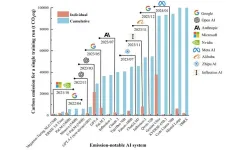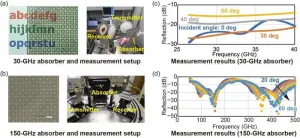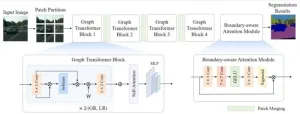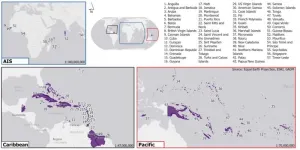Artificial intelligence: a double-edged sword for the environment?
2024-11-08
(Press-News.org)
As artificial intelligence (AI) technology progresses, the energy demands of training complex models have surged, raising widespread concerns about associated carbon emissions. This rapid growth is fueled by global demand across industries and academia, leading to exponential increases in computing power that carry significant environmental consequences. Given these challenges, in-depth research is essential to fully understand AI's carbon footprint and develop strategies for mitigating its environmental impact.
In a view (DOI: 10.1007/s11783-024-1918-y) by researchers from Zhejiang University and Nankai University, published in Frontiers of Environmental Science & Engineering on October 20, 2024, AI systems' carbon emissions were rigorously evaluated. The study analyzed emissions from 79 major AI systems between 2020 and 2024, underscoring the need for regulatory measures and standardized emissions caps. The findings estimate that these AI systems could emit more than 102 million tons of CO₂ annually, signaling the urgent need for policies to mitigate AI’s environmental footprint.
The research team quantified carbon emissions from 79 notable AI models released between 2020 and 2024, finding significant discrepancies in energy consumption. For example, Google’s Gemini Ultra model alone accounts for 36.7% of emissions among top AI systems, while GPT-4’s emissions rise twelvefold compared to its predecessor. The study reveals that operational demands in AI usage often eclipse training emissions, with annual emissions estimated at 960 times those from a single training run due to the global surge in AI service demand. Economically, the implications are vast: with a projected carbon price of $109 per ton, AI-related emissions could cost the industry over $10 billion annually. These findings underscore the need for standardized emission metrics and caps, as AI’s carbon footprint is now comparable to the annual emissions of entire countries.
Dr. Meng Zhang, lead researcher from Zhejiang University, remarked, “The exponential growth in AI capabilities mirrors a concerning rise in its environmental impact. This study underscores the urgent need for the AI industry to adopt greener practices and sustainable standards. Our goal is to equip policymakers with the data needed to address AI’s carbon footprint through proactive regulations.” Dr. Zhang emphasized that balancing AI innovation with environmental responsibility is key to fostering a sustainable future.
The study's findings carry significant implications for environmental policy and AI development. As AI applications expand globally, managing carbon emissions becomes essential for minimizing environmental impacts and achieving climate goals. Emission caps could encourage the industry to adopt energy-efficient practices, prompting innovation in sustainable AI technology. Additionally, AI-related carbon metrics could assist policymakers in setting effective standards, ensuring that as AI advances, its environmental costs are controlled, paving the way for a sustainable AI future.
END
[Attachments] See images for this press release:

ELSE PRESS RELEASES FROM THIS DATE:
2024-11-08
Tsukuba, Japan—Students often appear for high-stakes tests that hold significant weight in determining their futures. One such examination, the Common Test for University Admissions, currently allows examinees using braille an extended examination time of 1.5 times the standard duration. However, with the recent increase in complex questions and questions involving charts and diagrams in such tests, it is necessary to review whether the current accommodations remain adequate.
The researchers assessed the validity of the current time extension for examination questions containing complex tables by measuring the time required to read the text and complex tables. The results showed that ...
2024-11-08
5G wireless communication services have rapidly expanded worldwide, leveraging millimeter-wave (mmW) frequencies in the 24 GHz to 71 GHz range (referred to as frequency range 2, or FR2). Looking ahead, Beyond 5G and 6G services, projected to offer ultra-fast connectivity exceeding 100 Gbit/s, are expected to be introduced in the 2030s. Frequencies in the 150-GHz to 300-GHz range are being considered as potential candidates for these future networks. However, critical components such as radio-wave absorbers, essential for packaging and modularization, still need to be developed. These absorbers play a key role in reducing ...
2024-11-08
The transformer-based semantic segmentation approaches, which divide the image into different regions by sliding windows and model the relation inside each window, have achieved outstanding success. However, since the relation modeling between windows was not the primary emphasis of previous work, it was not fully utilized.
To solve the problems, a research team led by Zizhang Wu published their new research on 15 October 2024 in Frontiers of Computer Science co-published by Higher Education Press and Springer ...
2024-11-08
TUCSON, Ariz., November 7, 2024 — Critical Path Institute® (C-Path) today announced key leadership appointments: Diane Stephenson, Ph.D., has been promoted to Vice President of Neurology, and Nadine Tatton, Ph.D., has been welcomed as the new Executive Director of C-Path’s Critical Path for Alzheimer’s Disease (CPAD) Consortium.
With over 30 years of specialized research in neuroscience and drug development and having served as the Executive Director of the Critical Path for Parkinson’s Consortium (CPP) for nearly 15 years, Dr. Stephenson has been an extraordinary partner in advancing our understanding ...
2024-11-08
First-of-its-kind analysis of US national data reveals significant disparities in individual well-being as measured by lifespan, education, and income.
White males make up largest share of the group with lowest well-being while American Indian and Alaska Native individuals, and Black males, face the most significant challenges to overall well-being.
Populations at the lowest levels of well-being across the US are especially concentrated in the Deep South, Appalachia, and the Rust Belt.
The ...
2024-11-08
Exercise-only programmes help cut the severity of the ‘baby blues’ and the risk of major clinical depression in new mums, finds a pooled data analysis of the available evidence, published in the British Journal of Sports Medicine.
But at least 80 weekly minutes of moderate intensity exercise, such as brisk walking, water aerobics, stationary cycling, and resistance training with bands, weights, or body weight are needed to achieve the effects, the findings show.
Maternal depression and anxiety are relatively common after giving birth and associated with reduced self-care and compromised infant caregiving and bonding, ...
2024-11-08
Changes in the make-up of the gut microbiome are linked to the onset of clinically evident rheumatoid arthritis in those at risk of the disease because of genetic, environmental, or immunological factors, suggests research published online in the Annals of the Rheumatic Diseases.
It’s not clear if this instability is a cause or consequence of disease development, emphasise the researchers, but the findings might nevertheless help to identify those at risk as well as paving the way for preventive and personalised treatment strategies, they suggest.
Previously published research consistently shows an unfavourable imbalance in ...
2024-11-08
Changes in the gut microbiome before rheumatoid arthritis is developed could provide a window of opportunity for preventative treatments, new research suggests.
Bacteria associated with inflammation is found in the gut in higher amounts roughly ten months before patients develop clinical rheumatoid arthritis, a longitudinal study by Leeds researchers has found.
Affecting more than half a million people in the UK, rheumatoid arthritis is a chronic disease that causes swelling, pain and stiffness in the ...
2024-11-08
A new study has exposed for the first time how inhabitants of the smallest countries globally, contributing least to climate change, already bear the brunt of its devastating consequences and the burden is likely to worsen.
The research, led by the University of Bristol, showed on average nearly one in five people (20%) in Small Island Developing States (SIDS) – totalling some 8.5million – are now exposed to coastal and inland flooding. For three of the 57 countries concentrated in the Pacific, Caribbean, Indian Ocean, ...
2024-11-08
An independent review, Uniting the UK’s Health Data: A Huge Opportunity for Society, published today (8 November 2024), has found that complexities and inefficiencies are impeding the use of the UK’s rich sources of health data to improve people’s health and lives. Researchers and analysts frequently have to wait many months – or even years – to securely access health data to improve care and for vital research into diseases like dementia, cancer and heart disease.
Led by Professor ...
LAST 30 PRESS RELEASES:
[Press-News.org] Artificial intelligence: a double-edged sword for the environment?



